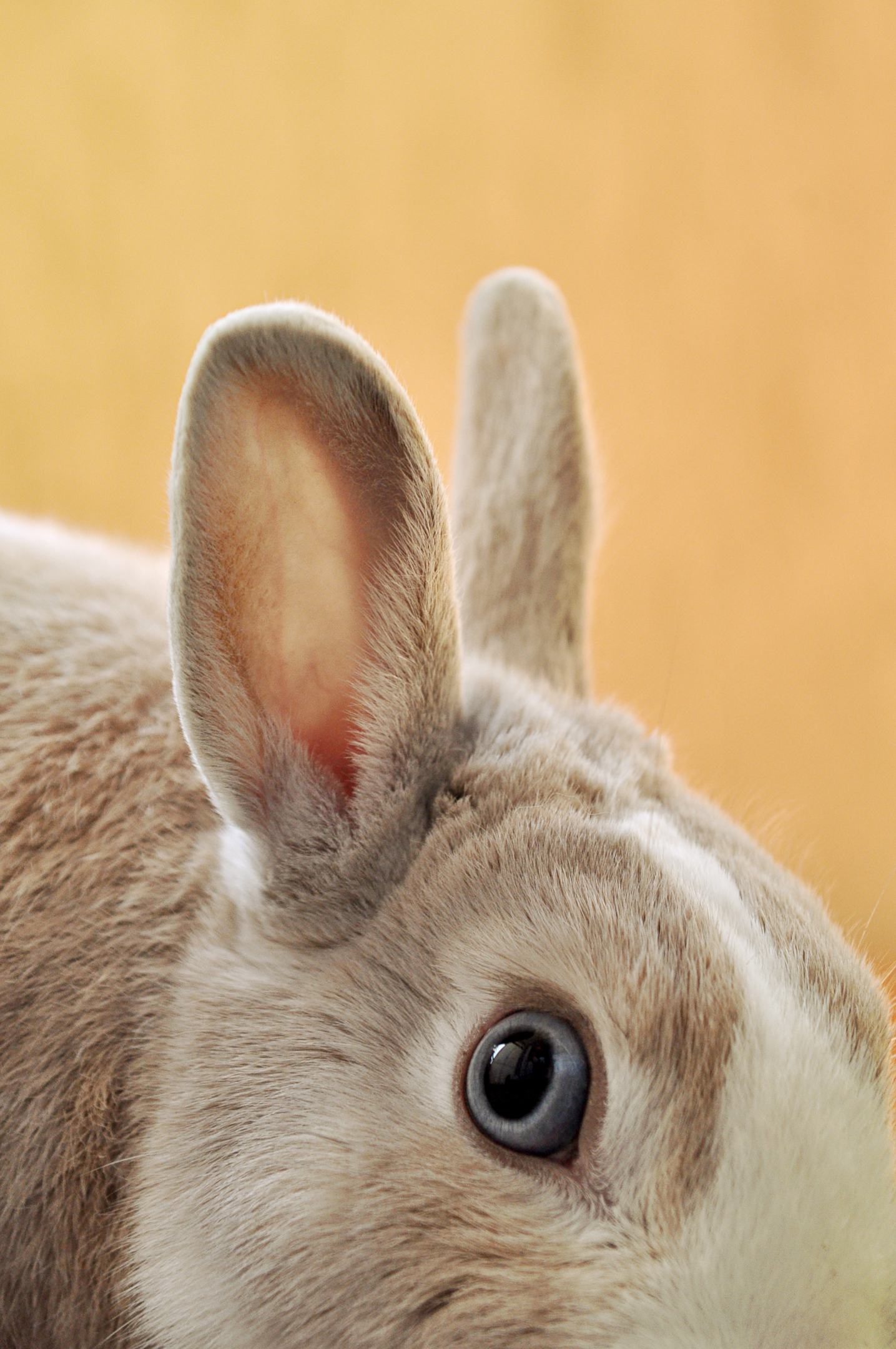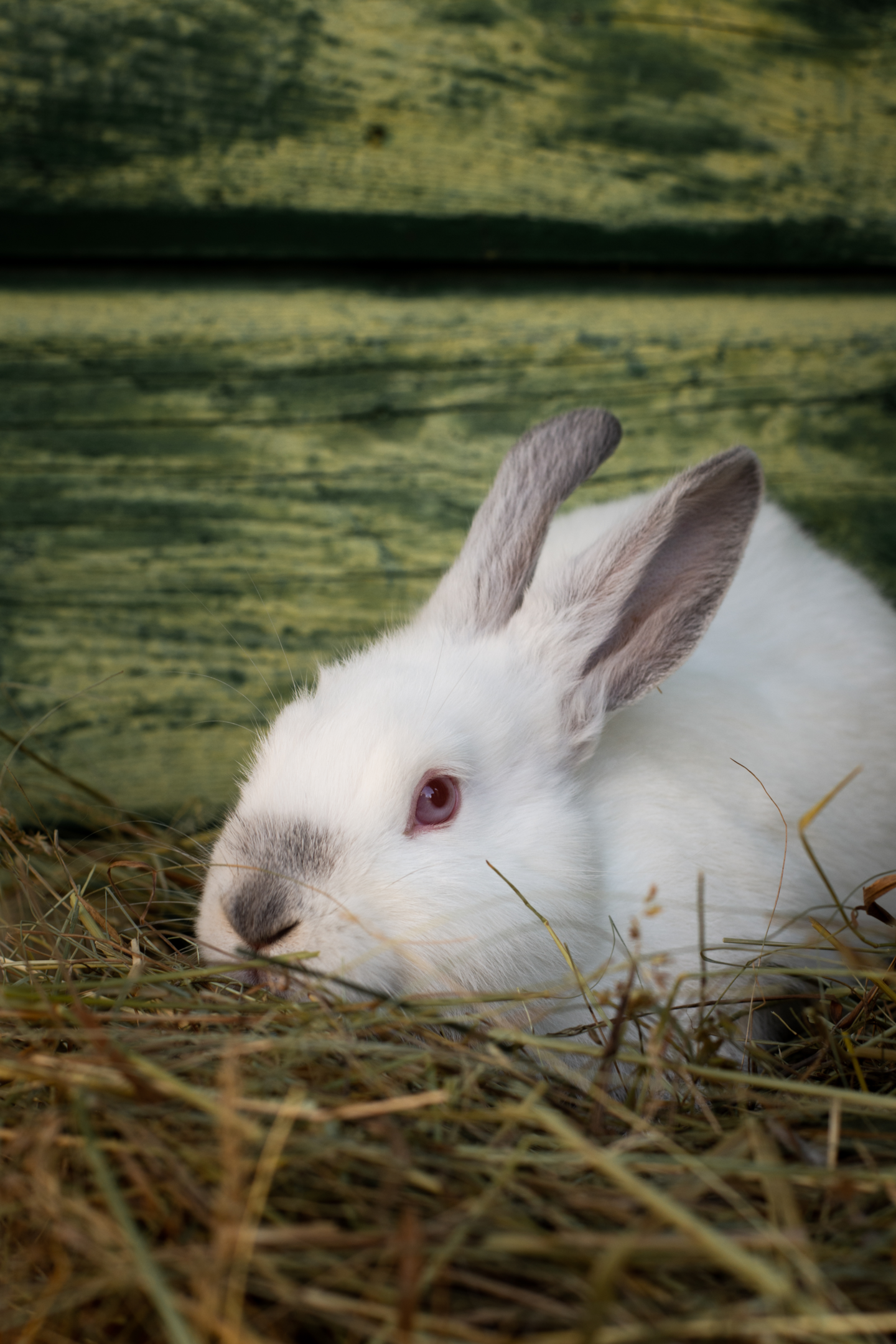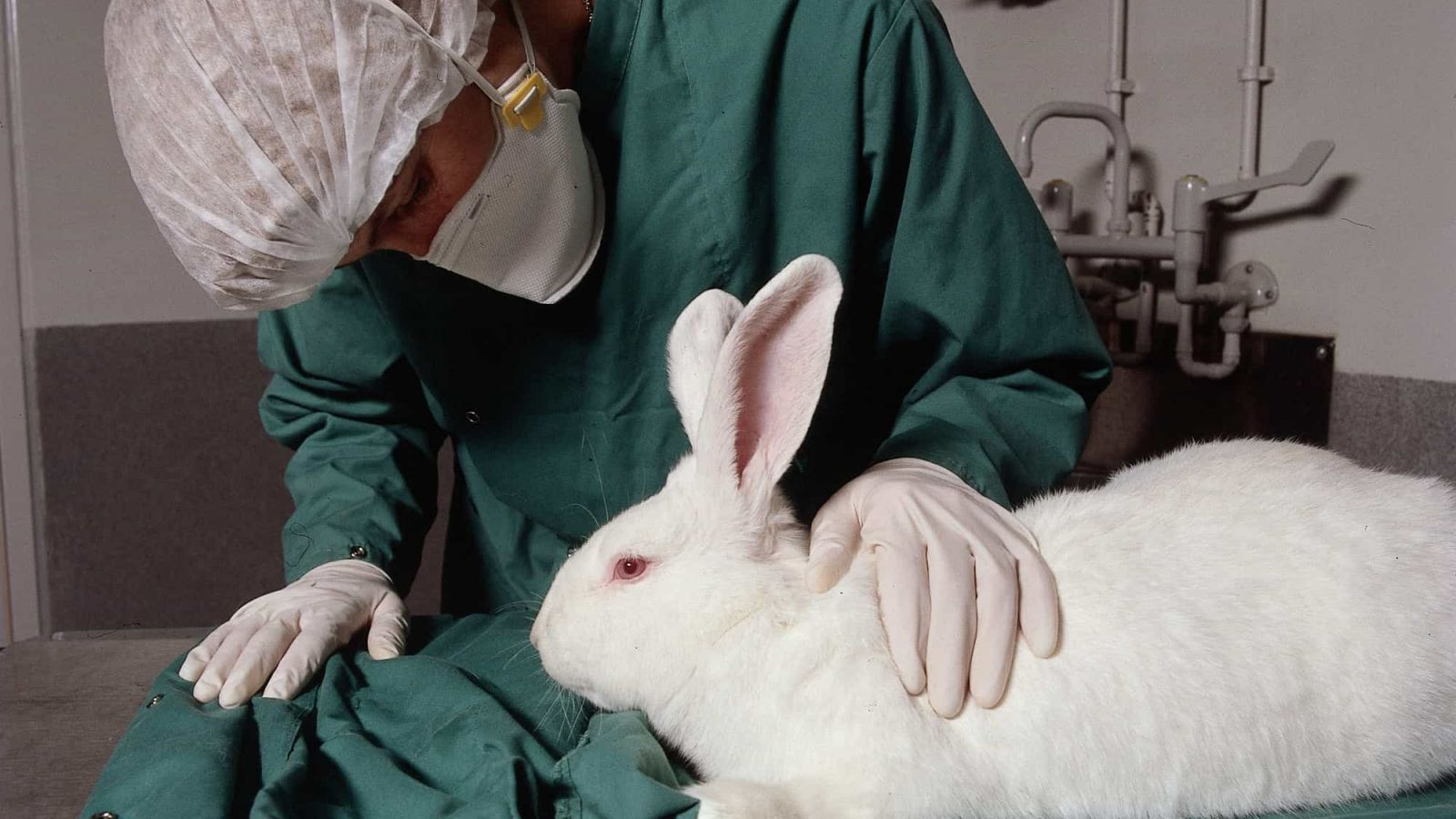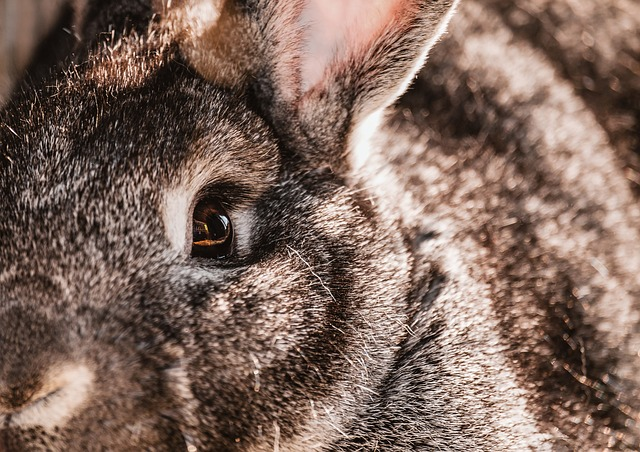Welcome to our guide on rabbit eye health! If you’re a rabbit owner, you know how important it is to watch your furry friend’s well-being. This article will delve into rabbit eye problems, helping you identify and address common issues affecting your bunny’s ocular health. Weepy eyes in rabbits might indicate serious eye problems. So, Learn how to spot potential concerns and take the necessary steps to ensure your rabbit’s eyes stay bright, clear, and healthy.
How to Tell if Your Rabbit Has an Eye Problem?

Detecting eye problems in your rabbit is important for their health and well-being. Rabbits can develop various eye issues, and early detection and treatment are crucial. Here are some signs to look for if you suspect your rabbit has an eye problem:
- Watery or Discharge: If your rabbit’s eye is constantly watery or has a discharge (clear, white, or colored), it may indicate an eye infection or irritation.
- Cloudiness: Cloudiness in the eye can indicate cataracts, corneal ulcers, or other eye conditions. It can manifest as a white or gray film over the eye.
- Redness: Redness in the eye may indicate inflammation, conjunctivitis, or other potential underlying issues. The blood vessels in the eye may appear more prominent than usual.
- Squinting or Blinking: If your rabbit is frequently squinting or blinking one or both eyes, it could be a sign of discomfort, pain, or an eye issue.
- Rubbing or Scratching: Constantly rubbing or scratching the eye with a paw may indicate irritation or discomfort. Be cautious, as excessive rubbing can lead to further injury.
- Swelling: Swelling around the eye or eyelids indicates an underlying issue. It could be due to an injury, abscess, or other conditions.
- Change in Eye Size: A noticeable change in the size of one or both eyes could indicate glaucoma or other serious problems. One eye appearing larger than the other should be investigated promptly.
- Visible Foreign Objects: Sometimes, foreign objects like hay dust, grass seed, or debris can get lodged in a rabbit’s eye, causing discomfort and potential complications. Similarly, foreign objects may accidentally enter the respiratory tract or nasal cavity. If you can see a foreign body in the eye, do not attempt to remove it yourself; seek veterinary assistance.
What Are the Various Eye Problems That My Rabbit Might Experience?

Your pet rabbit could encounter various common eye problems, and it’s vital to be aware of the symptoms. Weepy eyes in rabbits might indicate a serious infection that simply rinsing with saline solution won’t resolve. Common infections or problems rabbits may face include eye infections, conjunctivitis, abscesses, blocked tear ducts, corneal ulcers, glaucoma, uveitis, cataracts, and infectious diseases. Let’s look at a couple of these more prevalent conditions.
Abscesses
Eye infections are quite common in rabbits when bacteria enter the eye. Another common issue is abscesses, which often develop behind the eye and are referred to as retrobulbar abscesses. Dental problems, like dental disease, frequently cause these abscesses. In severe cases, the tooth roots of the upper cheek teeth can come into contact with the eye and may even penetrate it.
An infection caused by bacteria from their food can sometimes lead to an abscess. If you observe that your rabbit’s eye is bulging and there’s discharge from their eye or nose, it could be an abscess. Unfortunately, treating these abscesses can be challenging due to their location. In many cases, the only effective treatment is to remove the affected eye.
Cataracts
A cataract is like a cloudy curtain that forms over your rabbit’s eye lens. This can make your bunny’s vision get worse over time and might even lead to blindness. It can affect one or both eyes and could be something your rabbit is born with or develops as they age, often without any clear reason.
If your rabbit does get a cataract, you’ll likely spot their eye looking cloudy, with a white or greyish appearance. Usually, cataracts in rabbits aren’t treated, but here’s the interesting part: rabbits are pretty good at adjusting to blindness. However, if you want to explore options, surgery to remove the cataract is possible and something you can discuss with your vet.
Pink Eye
Commonly referred to as conjunctivitis, it is usually the result of an infection. Often, it’s a bacterial infection stemming from bacteria like Pasteurella or Staphylococcus. However, it can also result from living in a dusty environment due to inadequate care or using the wrong type of bedding. Other factors, such as viruses or underlying eye conditions like tear duct blockages, ulcers, or injuries, can also trigger conjunctivitis.
The primary sign of conjunctivitis is pink or reddish eyes. Your bunny might also experience excessive tearing and other symptoms like red eyes. The good news is that it can be effectively treated with antibiotics and anti-inflammatory medications.
Eye Ulcers
Ulcers are open sores that develop on the cornea, the clear front part of the eye. They often occur due to trauma ( Injuries) or if your rabbit has eyelid issues. It’s not uncommon, especially in rabbits that like to have tiffs with each other. Sometimes, even a tiny piece of hay finding its way into your bunny’s eye can lead to an ulcer.
Keep an eye out for signs like your rabbit frequently closing one eye or rubbing their eye or face too much – these could be indications of an ulcer. To confirm, your vet will use special fluorescent eye drops. If it turns out to be an ulcer, the usual course of action involves treating it with antibiotic eye drops.
Glaucoma
Glaucoma is a condition where the pressure inside your rabbit’s eye increases, causing pain and potentially leading to blindness. Although not common in rabbits, it does occur. Unfortunately, glaucoma often shows no symptoms in its early stages, and by the time signs become apparent, damage may have already occurred. Advanced glaucoma can result in the enlargement of the eyeball, which stretches the supporting connective tissue and causes inflammation in the surrounding areas. The eye may sometimes respond to this irritation with excess tear production. In specific rabbit breeds, such as the New Zealand White and those with New Zealand White ancestry, glaucoma can be inherited as a recessive trait.
Similar to ulcers, if you notice your bunny frequently closing one eye or rubbing their eye or face excessively, these could be indicators of glaucoma. The positive news is that glaucoma can be treated, and if detected early, the outlook is generally favorable.
Tear Duct Obstruction
You might notice some telltale signs if there’s a blockage or tear duct problem in your rabbit’s tear duct. Thick, white discharge or eye boogers from the corner of the eye are a common giveaway. Conjunctivitis, nasal discharge, and skin irritation on the face can also crop up frequently due to this sticky discharge. Unfortunately, treating this condition can be quite challenging.
Your vet’s approach will likely involve clearing the infection by flushing the tear ducts with oral antibiotics. However, since dental issues often trigger this problem, your vet must delve into your rabbit’s dental health to prevent a recurrence.
Uveitis
Uveitis is inflammation inside your bunny’s eyeball, which can be life-threatening. Detecting it can be tricky, but it’s crucial because uveitis can result from infections, injuries, or something foreign in the eye and can eventually cause blindness. If you notice any signs of uveitis, such as a sticky discharge, it’s essential to seek veterinary attention promptly to treat the condition.
The treatment varies depending on what’s causing it, but your vet might recommend steroids or anti-inflammatory treatments to ease the inflammation. In some severe cases, surgery could be necessary to remove the affected eye.
Here’s an additional informational video about rabbit eye infections Rabbit 101: Rabbit Eye Common Infections By Pets Life
What Steps Should I Take if My Rabbit is Experiencing an Eye Issue?

If you notice that your rabbit is having an issue with their eyes, here are some important steps to take:
- Isolate Your Rabbit: First, separate the affected rabbit from any other rabbits you have to prevent the potential spread of infection.
- Gently Clean the Eye: Use a damp cloth to wipe away any eye discharge gently. Be cautious not to touch the eye, which can cause further irritation.
- Contact Your Vet ASAP: Reach out to your veterinarian without delay. They can accurately diagnose the condition and suggest the appropriate treatment.
While waiting for the vet’s guidance, here are some ways to assist your rabbit:
- Maintain Eye Hygiene: Maintain eye cleanliness by delicately wiping away any discharge using a moist cloth several times daily.
- Avoid Over-the-counter Medications: Refrain from using eye medications on your rabbit, as these can harm them.
- Monitor Eating and Drinking: Ensure your rabbit continues eating and drinking normally. If they’re not, notify your veterinarian immediately.
Depending on the cause of the eye problem, your vet may prescribe antibiotics, eye drops, or other medications. In more serious instances, surgical intervention may become necessary.
Follow your veterinarian’s instructions carefully to ensure your rabbit fully recovers. Your rabbit’s well-being is the top priority, and your vet will provide the best guidance for their specific condition.
Additional Tips for Preventing Eye Problems in Rabbits

To guarantee the well-being of your rabbit’s eyes and their general health, here are some straightforward steps to adhere to:
- Maintain a Clean Cage: Keep your rabbit’s living area clean and free from dust and allergens. Maintaining a clean environment reduces the likelihood of eye irritation.
- Healthy Diet and Hydration: Provide your rabbit with a balanced diet and ensure access to plenty of fresh water. Adequate nutrition is crucial to their overall well-being, including their eyes’ health.
- Regular Dental Check-ups: Schedule an appointment for your furry friend’s regular dental check-ups. Healthy teeth are vital for rabbits, as dental issues can indirectly affect their eyes.
- Vaccinations: Ensure your rabbit is up-to-date on vaccinations, including protection against diseases like myxomatosis and other common illnesses. This can safeguard their overall health.
- Prompt Medical Attention: If your rabbit develops any medical conditions, such as a respiratory infection, seek prompt treatment from a qualified veterinarian. Timely intervention can prevent complications that may impact their eyes.
By following these guidelines, you can contribute to maintaining your rabbit’s eye health and preventing potential issues from arising. Your attentive care is crucial in keeping your furry friend happy and healthy.
Eye-Catching Wisdom: Nurturing Your Bunny’s Vision for a Bright and Bouncy Life!
In wrapping things up, it’s crystal clear that looking after your bunny’s peepers is absolutely crucial for their overall happiness and health. Throughout this all-encompassing guide, we’ve dished out some real gems of wisdom about the most common eye hiccups that can happen to rabbits. We’ve shown you how to spot the telltale signs and what proactive measures you can take if your fluffy friend happens to have a blinkin’ eye issue.
The name of the game here is early detection and swift veterinary action. That’s the secret sauce to keeping your bunny’s eyes as sparkling as a starry night. By sticking to these top-notch guidelines and keeping a keen eye on your furball’s ocular health, you’re essentially giving them a VIP ticket to a happy and healthy bunny life.
But remember, if you ever find yourself scratching your head with more questions or fretting over any bunny eye business, don’t hesitate to reach out to your trusty veterinarian. They’re your go-to sidekick in the epic saga of caring for your beloved floppy-eared companion. Together, you and your bunny doc can ensure your fluffy buddy enjoys a life full of bright-eyed adventures.
FAQs
Is Weepy Eye in Rabbits Contagious?
Rabbit’s weepy eye can be contagious, especially when a bacterial infection triggers it. The main culprit behind this is often conjunctivitis, which you might know as pink eye. When bacteria cause it, it can easily spread from one rabbit to another. This happens through direct contact with the infected rabbit’s tears or eye discharge. Objects like food bowls, bedding, or toys that have come into contact with the infected rabbit’s eye can harbor the bacteria and potentially pass the infection to other bunnies. So, taking precautions if one of your rabbits has a weepy eye caused by a bacterial infection and consulting a vet for proper care is essential.
Can a Rabbit Live With Blocked Tear Duct?
Rabbits can live with blocked tear duct problems, but addressing the issue is essential to ensure their comfort and well-being. A blocked tear duct can cause discomfort, excessive tearing, and, in some cases, secondary infections.
🐰🌟 Discover The Rabbit Hop 🌟🐰
👉 Dive into a world of rabbit care and companionship at The Rabbit Hop! 👈
🥕🏠 Explore our website: https://therabbithop.com/
💬 Connect with a Passionate Community: Join fellow rabbit lovers, share experiences, and get support from our friendly community.
💬 Let’s learn more about our bunnies! Follow us on Facebook, Instagram, and Twitter for easy tips, fun stories, and a friendly group that also loves rabbits.
Facebook: https://www.facebook.com/therabbithop2 Connect with us on Facebook at “The Rabbit Hop” for a treasure trove of bunny-related insights. Discover easy tips, heartwarming stories, and join a friendly community that shares your love for rabbits. Explore rabbit care, behavior, and more.
Instagram: https://www.instagram.com/the_rabbit_hop/ Dive into the world of bunnies with us on Instagram! Follow @the_rabbit_hop for delightful snapshots of rabbit adventures, informative tidbits, and adorable moments. Join a community that celebrates the charm and companionship of these furry friends.
Twitter: https://twitter.com/Hop1Rabbit. Stay in the loop with all things rabbit-related on Twitter! Follow @Hop1Rabbit for quick tips, playful anecdotes, and rabbit-loving camaraderie.
Engage with fellow bunny enthusiasts and enrich your understanding of rabbit care and companionship. Let’s get to know our bunnies better together! Hop on over to The Rabbit Hop now! 🐇🌈 Visit us at: https://therabbithop.com/



